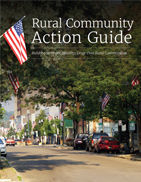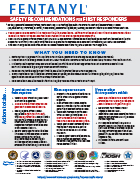Communities & First Responders
Communities
- Encourage providers, persons at high risk, family members, and others to learn how to prevent and manage opioid overdose.
- Ensure access to treatment for individuals who are misusing or addicted to opioids or who have other substance use disorders.
- Ensure ready access to naloxone.
- Encourage the public to call 911 for individuals experiencing opioid overdose.
- Encourage prescribers to use state Prescription Drug Monitoring Programs.
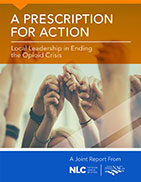 A Prescription for Action: Local Leadership in Ending the Opioid Crisis
A Prescription for Action: Local Leadership in Ending the Opioid CrisisReport from National Association of Counties and the National League of Cities examines how cities and counties can strengthen collaboration with each other and state, federal, private-sector and non-profit partners to tackle the opioid crisis. The report also includes recommendations for state and federal officials, who are pivotal partners in local efforts to combat opioid misuse, diversion, overdose and death.
First Responders
5 Essential Steps for Opioid Overdose:
- Call for Help (Dial 911)
- Check for Signs of Opioid Overdose
- Support the Person’s Breathing
- Administer Naloxone
- Monitor the Person’s Response
First Responders are on the front lines of the opioid epidemic and are at risk for post-traumatic stress disorder (PTSD) and burn-out. Check out these tips for taking care of yourself.
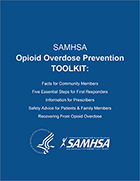 Source: Substance Abuse and Mental Health Services Administration. SAMHSA Opioid Overdose Prevention Toolkit. HHS Publication No. (SMA) 16-4742. Rockville, MD: Substance Abuse and Mental Health Services Administration, 2016.
Source: Substance Abuse and Mental Health Services Administration. SAMHSA Opioid Overdose Prevention Toolkit. HHS Publication No. (SMA) 16-4742. Rockville, MD: Substance Abuse and Mental Health Services Administration, 2016.
What Can Faith-Based Communities Do?
- Stop the stigma through education in your congregation and community. Visit www.StigmaFreeWV.org
- Learn new ways of talking about addiction. Use “person with substance use disorder” instead of “addict,” “person in recovery” instead of “former/reformed Addict/Alcoholic,” and “abstinent,” instead of “clean.”
- Sponsor training in your community, such as a Screening, Brief Intervention, Referral, and Treatment (SBIRT).
- Sponsor Naloxone training. Contact your local prevention coalition or health department to find out what is already being done and how you can help.
- Join a prevention coalition in your area.
- Provide sober community supports, such as helping someone find employment, transportation, or housing.
- Sponsor a Students Against Destructive Decisions (SADD) chapter for youth in your community.
- Lock and count your medications. Dispose of unused or expired medications properly.
- Do not provide alcohol to youth and encourage teens not to use alcohol until 21 years of age.
- Sponsor Recovery Coach Training and/or become a “Recovery Angel.”
- Celebrate the WV Day of Hope in your congregation!
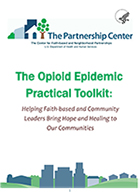 The Opioid Epidemic Practical Toolkit:
The Opioid Epidemic Practical Toolkit:Helping Faith-based and Community Leaders Bring Hope and Healing to Our Communities
Click here to view/download
Syringe Services Resources:


Join a Prevention Coalition in Your Region!
Region 1:
Brooke, Hancock, Marshall, Ohio, Wetzel
Contact:
Dara Pond
Youth Services System, Inc.
(304) 233-2045
dpond@ysswv.com
Region 2:
Berkeley, Grant, Hampshire, Hardy, Jefferson, Mineral, Morgan, Pendleton
Contact:
Barbra Masih MS, LPC, NCC, AADC, CRC, PSII
Potomac Highlands Guild
304-257-1155
barbiem@potomachighlandsguild.com
Region 3:
Calhoun, Jackson, Pleasants, Ritchie, Roane, Tyler, Wirt, Wood
Contact:
Alison Browning
Westbrook Health Services
304-927-5200
abrowning@westbrookhealth.com
Region 4:
Barbour, Braxton, Doddridge, Gilmer, Harrison, Lewis, Marion, Monongalia, Preston, Randolph, Taylor, Tucker, Upshur
Contact:
Elizabeth Shahan, MSW, LGSW, PSII
West Virginia Prevention Solutions
304-423-5049
Elizabeth@wvpreventionsolutions.org
Region 5:
Boone, Cabell, Clay, Kanawha, Lincoln, Logan, Mason, Mingo, Putnam, Wayne
Contact:
Kim Shoemake, MS
Prestera Center
304-412-7036
Kimberly.Shoemake@prestera.org
Region 6:
Fayette, Greenbrier, McDowell, Mercer, Monroe, Nicholas, Pocahontas, Raleigh, Summers, Webster, Wyoming
Contact:
Greg Puckett
Community Connections
304-913-4956
greg.puckett@strongcommunities.org
